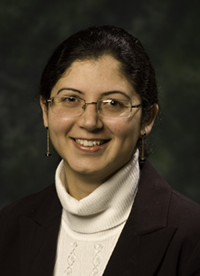
DENTON (UNT), Texas -- Can an online game help discover fast and effective algorithms that inspire architectural innovation and lead to opportunities for new designs to develop next generation electronic devices? Gayatri Mehta, associate professor of electrical engineering for the University of North Texas College of Engineering, thinks so – and she, along with a team of students, has created a free online game called “UNTANGLED” to prove it.
“One of the grand challenges in the design of portable and wearable devices is to achieve optimal efficiency and flexibility in a tiny, low power package,” Mehta said. “We are harnessing human intelligence and intuition to create faster, better and more efficient algorithms.”
The newly released “UNTANGLEDIII,” the latest version of the “UNTANGLED” series, is a research project disguised as an addictive – and free – game. Gamers have to unlock a series of blocks inlaid on a graph by placing them in a compact arrangement while adhering to specific constraints. This process mimics the challenge of efficiently organizing components within electronic devices. The new game has a community gameplay feature that allows players to build upon other players’ solutions.
“Although the game is presented to players abstractly, as connected elements in bold colors that must be untangled and arranged, it actually consists of real algorithms that players are mapping onto different chip architectures that could be manufactured in silicon,” Mehta said. “We find that players are very creative in quickly identifying compact arrangements of elements in our game. This is extremely exciting because we are not even close to this skill level in automatic algorithms for creating such layouts, and this limitation is holding back progress in highly customized chip design.”
By analyzing the players’ solutions collected from “UNTANGLEDIII,” Mehta and her team can develop algorithms that allow for rapid design space exploration, leading to opportunities for architecture designs that can be used in developing portable devices. These devices will be smaller, more powerful, and have longer battery life, which in turn can affect many areas, including health, safety and security and personal convenience and comfort.
“Our goal is to harness human intelligence to discover fast, efficient mapping algorithms for custom reconfigurable architectures. We’ve developed several algorithms from our research that have outperformed traditional algorithms,” Mehta said. “Now, we want to increase participation and widen the community of our players by promoting computational thinking among non-scientists and non-engineers. The vast amount of data that we collect from our players will be used to discover better and more efficient automated algorithms. ”
She plans to continue to expand “UNTANGLED” to include a multiplayer game where users can collaborate and work on large and complex problems together in real time.
Mehta, who is a proponent of out-of-the-box approaches to research, began the “UNTANGLED” project in 2012 using a National Science Foundation grant. She received another NSF grant last year, which was used to develop the latest version of the research game. While she’s excited about the project’s implications, she has made it clear that the most important result is to provide a strong education.
“This project has given great research and educational opportunities to a large number of undergraduate and graduate students,” Mehta said. “That’s all I can ask for.”




